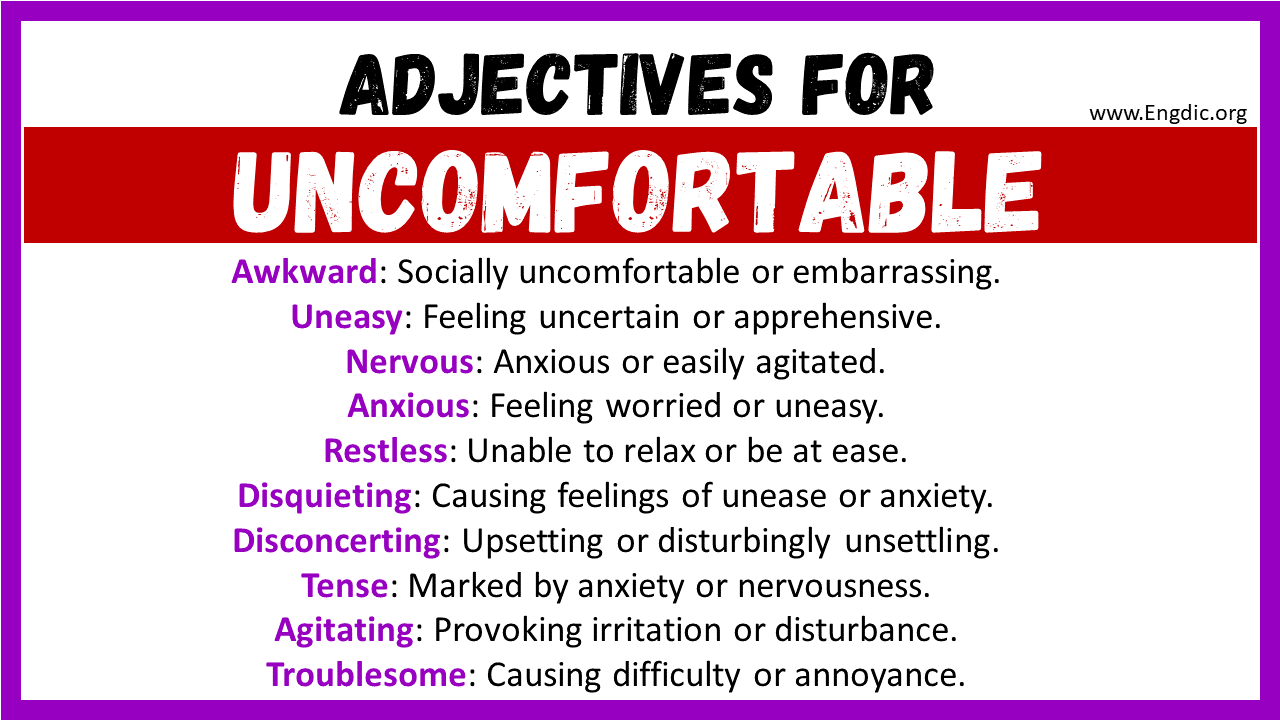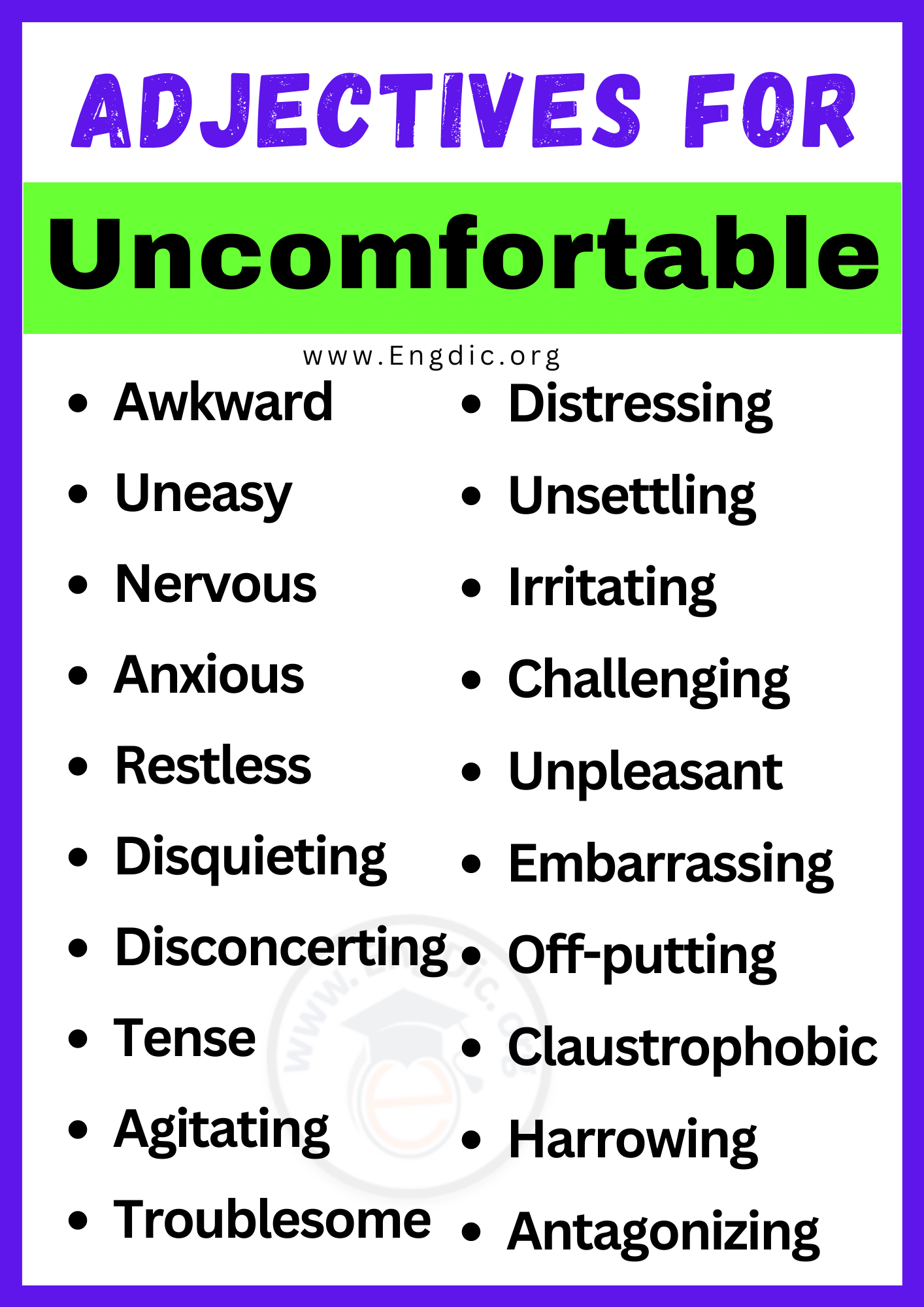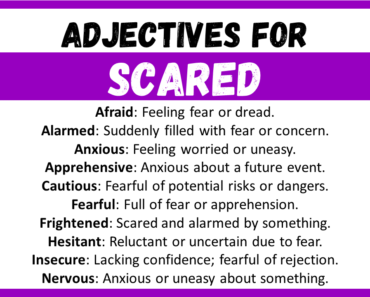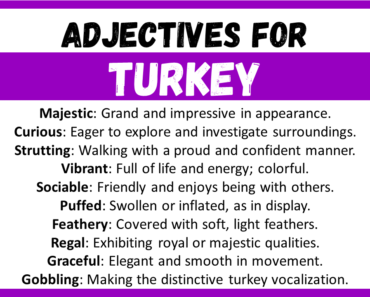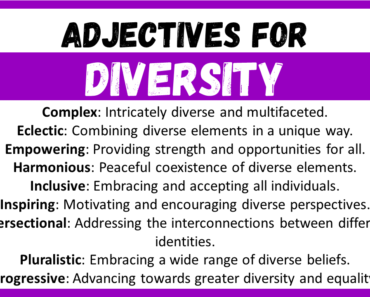Uncomfortable is a word we often use to describe a feeling of unease, awkwardness, or dissatisfaction. It’s that sensation that makes us squirm in our seats or long for an immediate escape. But how can we put this elusive emotion into words? In this blog post, we delve into a collection of words that capture the essence of discomfort. From “awkward” and “tense” to “unsettling” and “distressing,” we explore a range of descriptive terms that help us articulate those uncomfortable moments we all experience.
Adjectives for Uncomfortable
Here are the 20 Most Popular adjectives for uncomfortable:
- Awkward
- Uneasy
- Nervous
- Anxious
- Restless
- Disquieting
- Disconcerting
- Tense
- Agitating
- Troublesome
- Distressing
- Unsettling
- Irritating
- Challenging
- Unpleasant
- Embarrassing
- Off-putting
- Claustrophobic
- Harrowing
- Antagonizing
Words to Describe A Uncomfortable With Meanings
- Awkward: Socially uncomfortable or embarrassing.
- Uneasy: Feeling uncertain or apprehensive.
- Nervous: Anxious or easily agitated.
- Anxious: Feeling worried or uneasy.
- Restless: Unable to relax or be at ease.
- Disquieting: Causing feelings of unease or anxiety.
- Disconcerting: Upsetting or disturbingly unsettling.
- Tense: Marked by anxiety or nervousness.
- Agitating: Provoking irritation or disturbance.
- Troublesome: Causing difficulty or annoyance.
- Distressing: Causing sadness or discomfort.
- Unsettling: Creating a sense of unease or instability.
- Irritating: Annoying or provoking frustration.
- Challenging: Testing one’s comfort or abilities.
- Unpleasant: Not enjoyable or comfortable.
- Embarrassing: Causing self-consciousness or shame.
- Off-putting: Discouraging or unappealing.
- Claustrophobic: Feeling trapped or confined.
- Harrowing: Extremely distressing or traumatic.
- Antagonizing: Provoking or irritating someone deliberately.
Example Sentences for Uncomfortable Adjectives
- The awkward silence lingered between them.
- She felt uneasy walking alone in the dark.
- His nervous laughter betrayed his anxiety.
- I’m anxious about the upcoming exam results.
- The baby’s constant crying made her restless.
- The movie’s disquieting ending left me unsettled.
- The unexpected turn of events was disconcerting.
- The atmosphere in the room was tense with anticipation.
- The loud noise was highly agitating for the neighbors.
- Dealing with a broken car can be troublesome.
- The news of his sudden departure was distressing.
- The abandoned house had an unsettling
- His constant interruptions were irritating during the meeting.
- Climbing the steep mountain was a challenging
- The smell in the room was unpleasant and overwhelming.
- She felt embarrassing tripping in front of everyone.
- The strange behavior was off-putting to potential customers.
- Being in crowded spaces made her feel claustrophobic.
- The survivors’ stories were harrowing and heart-wrenching.
- His antagonizing comments provoked a heated argument.
Explore More:
Adjectives for Without Hesitation
FAQ’s
How to describe uncomfortable in writing?
Uncomfortable can be described as a feeling of unease or discomfort, making one uneasy or awkward in a situation.
Is uncomfortable a noun or adjective?
Uncomfortable is an adjective used to describe a state of unease or discomfort.
What’s another way to say I’m uncomfortable?
Another way to express feeling uncomfortable is to say “I feel uneasy” or “I’m not at ease.”
